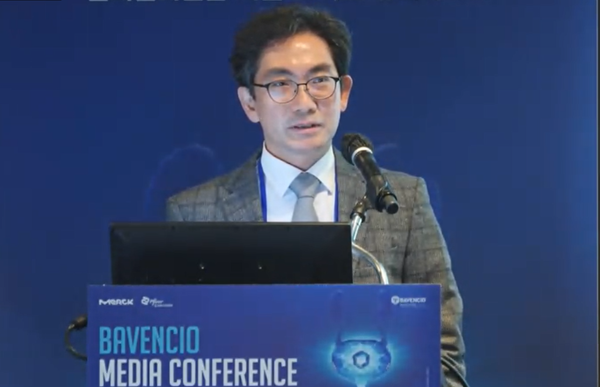Merck Biopharma Korea and Pfizer Korea said their joint immunotherapy Bavencio (ingredient: avelumab) received approval for treating urothelial carcinoma.

Bavencio, the first and only FDA-approved anti-PD-L1 immunotherapy, was first authorized to treat Merkel cell carcinoma in 2019 and received regulatory approval by the Ministry of Food and Drug Safety on Aug. 5 as first-line therapy for patients with locally advanced or metastatic urothelial carcinoma who have not progressed after using platinum-based chemotherapy.
The ministry approved the drug based on the results shown in the phase 3 JAVELIN Bladder 100 trial comparing the outcomes between the best supportive care (BSC) and the Babencio plus BSC.
During the study, the median overall survival period was extended by more than seven months in those who received Bavencio and BSC together compared to the comparative group under BSC care alone, with a risk of death reduced by 31 percent.
Bavencio is a medicine that induces natural killer (NK) cells to remove tumor cells through antibody-dependent cellular cytotoxicity (ADCC).
Professor Lee Jae-lyun of the Department of Oncology at Asan Medical Center introduced the current trend of urothelial cancer therapies in Korea and unmet medical needs.
Lee explained that urothelial carcinoma is the most common type of bladder cancer, accounting for about 90 percent of all cases. He pointed out that about 12 percent of patients entered into an advanced stage at diagnosis, and the five-year survival rate remains around 6 percent.
“Patients treated with Bavencio maintained a 7.1 months median overall survival period in the JAVELIN Bladder 100 study, showing a significant difference with 31 percent lowered death risk when compared to the control group,” Professor Lee said.
Lee also stressed that the one-year overall survival rate, one of the important endpoints of immunotherapy studies, was 58.4 percent in the control group, while the Bavencio group reached 71.3 percent.
“In 2018, urothelial carcinoma became one of the most common cancers, marking fourth in diagnosis frequency worldwide, and 10th most common male cancer in Korea,” said Javed Alam, general manager of Merck Biopharma Korea. “We are glad to provide a new therapeutic option for urothelial carcinoma patients with unmet medical needs through the recent approval.”
Song Chan-woo, head of the oncology business at Pfizer Pharma Korea, also said, “Bavencio prolonged lifespan and reduced the risk of death in patients with locally advanced or metastatic urothelial carcinoma during the study, and we wish the drug to provide a new hope for patients suffering from urothelial carcinoma.”
Based on the JAVELIN Bladder 100 study, the U.S. Food and Drug Administration approved Bavencio in July 2020 as maintenance therapy in adult patients with locally advanced or metastatic urothelial carcinoma who have not progressed after taking platinum-based chemotherapy. The European Commission also authorized the drug for the same indication in January.

